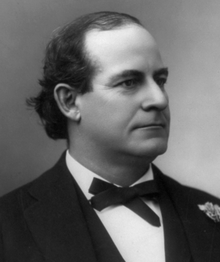William Jennings Bryan
| William Jennings Bryan | |
|---|---|
 |
|
| 41st United States Secretary of State | |
|
In office March 5, 1913 – June 9, 1915 |
|
| President | Woodrow Wilson |
| Preceded by | Philander C. Knox |
| Succeeded by | Robert Lansing |
| Member of the U.S. House of Representatives from Nebraska's 1st district |
|
|
In office March 4, 1891 – March 3, 1895 |
|
| Preceded by | William James Connell |
| Succeeded by | Jesse Burr Strode |
| Personal details | |
| Born |
March 19, 1860 Salem, Illinois, U.S. |
| Died | July 26, 1925 (aged 65) Dayton, Tennessee, U.S. |
| Political party | Democratic |
| Spouse(s) | Mary Baird Bryan (m. 1884–1925); his death |
| Children |
Ruth Baird Bryan Owen (1885–1954) William Jennings Bryan, Jr. (1889–1978) Grace Dexter Bryan (1891–1945) |
| Alma mater |
Illinois College Union College of Law |
| Profession | Lawyer |
| Religion | Presbyterianism |
| Signature | |
William Jennings Bryan (March 19, 1860 – July 26, 1925) was an American orator and politician from Nebraska, and a dominant force in the populist wing of the Democratic Party, standing three times as the Party's nominee for President of the United States (1896, 1900, and 1908). He served two terms as a member of the United States House of Representatives from Nebraska and was United States Secretary of State under President Woodrow Wilson (1913–1915). He resigned because of his pacifist position on World War I. Bryan was a devout Presbyterian, a strong advocate of popular democracy, and an enemy of the banks and the gold standard. He demanded "Free Silver" because he believed it undermined the evil "Money Power" and put more cash in the hands of the common people. He was a peace advocate, a supporter of Prohibition, and an opponent of Darwinism on religious and humanitarian grounds. With his deep, commanding voice and wide travels, he was perhaps the best-known orator and lecturer of the era. Because of his faith in the wisdom of the common people, he was called "The Great Commoner".
In the intensely fought 1896 and 1900 elections, he was defeated by William McKinley but retained control of the Democratic Party. With over 500 speeches in 1896, Bryan invented the national stumping tour in an era when other presidential candidates stayed home. In his three presidential bids, he promoted Free Silver in 1896, anti-imperialism in 1900, and trust-busting in 1908, calling on Democrats to fight the trusts (big corporations) and big banks, and embrace anti-elitist ideals of republicanism. President Wilson appointed him Secretary of State in 1913. After the Lusitania was torpedoed in 1915, Wilson made strong demands on Germany that Bryan disagreed with, resigning in protest as a pacifist. After 1920 he supported Prohibition and attacked Darwinism and evolution, most famously at the Scopes Trial in 1925 in Tennessee. Five days after the conclusion of the Scopes case, Bryan died in his sleep.
...
Wikipedia
